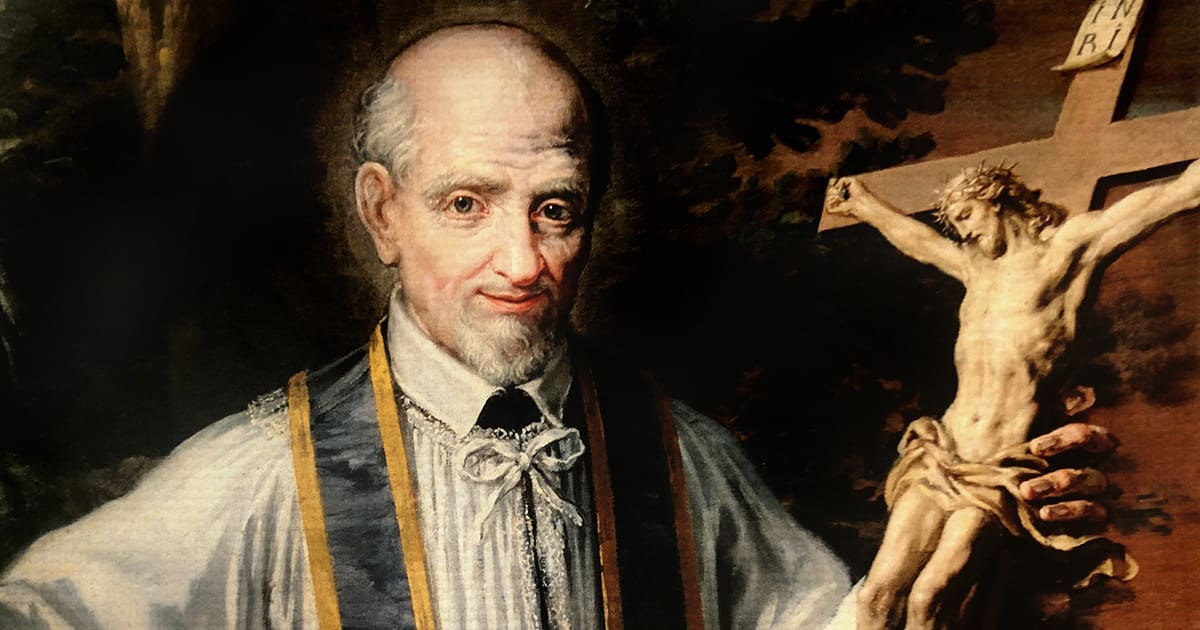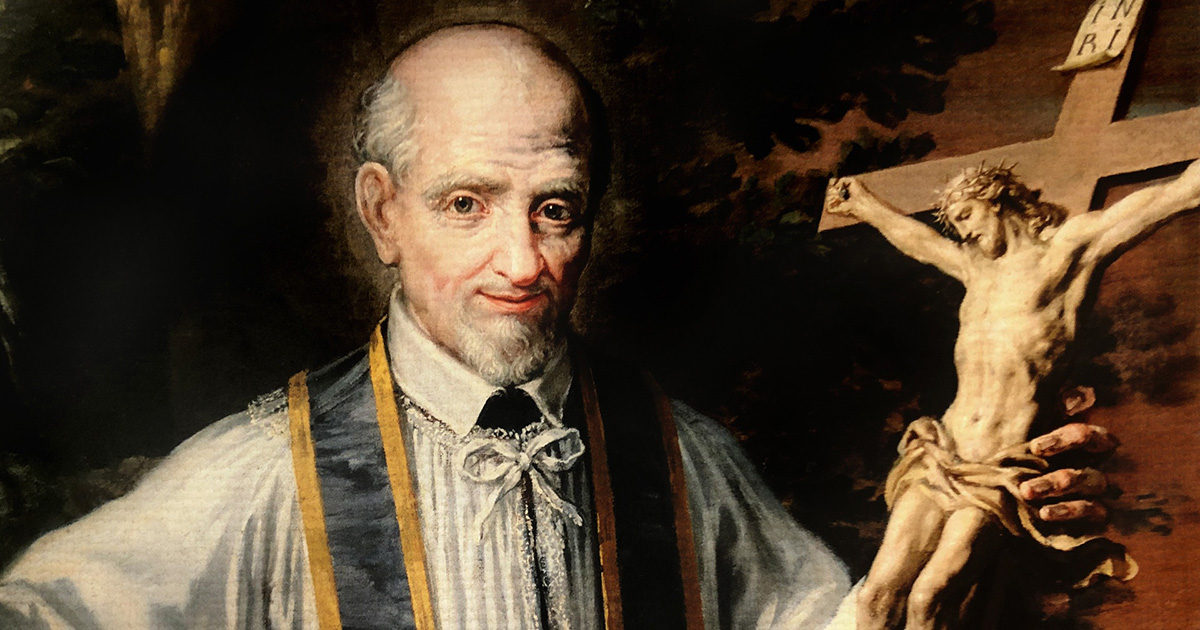Prayer According to Saint Vincent de Paul – Part I
Fr. Tomaž Mavrič, CM invited us to use prayer as a transforming force. We did not imagine that we would have to return to the subject throughout Lent. Today we want to offer you this article: “Prayer according to Saint Vincent de Paul” that will be presented in parts over three days in a row. On the third day, we will finish with the delivery of an electronic book. This theme is good for us in order to prepare for this Easter that we will live in our homes, in our communities, in our families. The author of the article helps us to enter deeply a topic that was very dear for Saint Vincent.
1. Preparation
In his explanation about the method of prayer, Vincent de Paul described those first moments: It is very important to place ourselves firmly in the presence of God, for the very gist of meditation depends on it; once that is done, the rest falls into place (CCD:XI:359)[1]. Here we are also referring to the experience of the psalmist who when speaking with God, stated: Listen to my voice in the morning, Lord. Each morning I bring my requests to you and wait expectantly (Psalms 5:4)[2].
Obviously, in order to attain any benefit from mental prayer, it is necessary to guarantee a certain degree of silence in which the voice of God can be heard in a clear and powerful manner: keep silence until after meditation the next day so that this recollection, which will appear exteriorly, may foster the conversation of your hearts with God (CCD:IX:6-7). Here our Founder seemed to refer to those words that are found in the Imitation of Christ: In silence and quiet the devout soul goes forward and learns the hidden things of the Scriptures (Book I, chapter XX, #6)[3].
On various occasions, Vincent insisted on the importance of retiring for the night at an appropriate hour. One was to get the necessary sleep so that one could awake with a good disposition on the following day. Vincent also recommended praying the following words upon awaking: My God, I adore you! O Lord, I give you my heart, grant me the grace never to offend you, but to do your will in all things (CCD:X:480).
According to Vincent, there are two forms of preparation: a) a proximate preparation, made immediately before the beginning of morning meditation; b) a remote preparation that is done the night before and consists of reading the points of meditation for the following day and sleeping with a good thought about the suggested theme. Vincent stated: Go to bed modestly and fall asleep with a good thought. This will be an easy way for you to remember God when you awake, and your mind will be better disposed to make your morning meditation (CCD:IX:7). The following procedure is to be followed during the time of remote and immediate preparation for prayer.
1.1 Place oneself in the presence of God
One is to allow oneself to be enlightened, comforted and inspired by the loving presence of God so that Our Lord can speak heart to heart (CCD:X:471). One should then make an act of faith, for example, I believe my God is here (CCD:X:473)
Vincent reminded the Sisters: Always begin all your prayers with an act of the presence of God … even though you do not see God, faith teaches us that his holy presence is everywhere … permeating everything, even the very depths of our heart (CCD:IX:4).
When addressing the members of the Congregation, Vincent stated: the practice of placing ourselves in the presence of God is growing little by little among us, and with the help of God, such a practice will become habitual. How many people in the world never lose sight of God’s presence.[4] From the perspective of Vincent de Paul, the practice of placing ourselves in the presence of God leads us to live our life in a manner that is inspired by the conviction that we are always in the presence of One who loves us and accompanies us with love and mercy. The Apostle Paul reminds us of that same reality when he states: In God we live and move and exist (Acts 17:28).
Vincent referred to Saint Francis de Sales, from whom he borrowed the method for mental prayer and stated: [St. Francis says] we can place ourselves in the presence of God in four ways: contemplating him in the Blessed Sacrament, reflecting on the joy of seeing God adored in heaven, affirming the reality that God is everywhere, and affirming that God is present in those persons who allow themselves to be captivated by his love.
A prayer, that is found in the spiritual writings of Louise de Marillac, can also serve as a source of inspiration during this initial moment of prayer: I adore you, O my God, and recognize that you are the author of my existence. Because of the love l owe you, I abandon myself entirely to your holy will in my life. Although I am filled with powerlessness and reasons for humiliation on account of my sins, I trust in your mercy. I beg you, because of the love you have for your creatures, to send the assistance of the Holy Spirit so as to produce the full effect of the plan which your holy will has had, from all eternity, for my soul and for all souls redeemed by the blood of Jesus Christ (SWLM:691 [A.1]).
______________________________
1 All references to the writings of Vincent de Paul are taken from: Vincent de Paul, Correspondence, Conference, Documents, translators: Helen Marie Law, DC (Vol. 1), Marie Poole, DC (Vol. 1-14), James King, CM (Vol. 1-2), Francis Germovnik, CM (Vol. 1-8, 13a-13b [Latin]), Esther Cavanagh, DC (Vol. 2), Ann Mary Dougherty, DC (Vol. 12); Evelyne Franc, DC (Vol. 13a-13b), Thomas Davitt, CM (Vol. 13a-13b [Latin]), Glennon E. Figge, CM (Vol. 13a-13b [Latin]), John G. Nugent, CM (Vol. 13a-13b [Latin]), Andrew Spellman, CM (Vol. 13a-13b [Latin]); edited: Jacqueline Kilar, DC (Vol. 1-2), Marie Poole, DC (Vol. 2-13b), Julia Denton, DC [editor-in-chief] (Vol. 3-10, 13a-13b), Paule Freeburg, DC (Vol. 3), Mirian Hamway, DC (Vol. 3), Elinor Hartman, DC (Vol. 4-10, 13a-13b), Ellen Van Zandt, DC (Vol. 9-13b), Ann Mary Dougherty (Vol. 11-12 and 14); annotated: John W. Carven, CM (Vol. 1-13b); New City Press, Brooklyn and Hyde Park, 1985-2014. These references will be inserted in the text using the initials [CCD] followed by the volume number, followed by the page number, for example, CCD:XI:359).
2 All Scripture references are taken from: Africa Study Bible, New Living Translation, copyright © 1996, 2004, 2015 by Tyndale House Foundation. Used by permission of Tyndale House Publishers, Inc., Carol Stream, Illinois, 60188. All rights reserved.
3 Thomas a Kempis, The Imitation of Christ, translated by Reverend Willian Benham and accessed at: http://www.orthodoxebooks.org/sites/default/files/pdfs/The%20Imitation%20of%20Christ%20-%20Thomas%20Kempis.pdf
4 Translator’s Note: this article was written in Portuguese and the references are made to the Portuguese text, which does not correspond to the Spanish or English text. I was unable to find the referenced text. The closest I came was a text that referred to the will of God, not the presence of God: this practice of doing the will of God; gradually it will take hold of us and become a habit … we will finish by being at home with it and always energized by. How many people never lose sight of God (CCD:XII:136)
5 All references to the writings of Louise de Marillac are taken from: Louise de Marillac, Spiritual Writing of Louise de Marillac, edited and translated from the French by Sister Louise Sullivan, DC, New City Press, Brooklyn, New York, 1991. These references will be inserted in the text using the initials [SWLM] followed by the page number, followed by number of the letter or the number of the writing and or manuscript, for example, (SWLM:691 [A.1])[5].
Fr. Vinicius Teixeira Ribeiro, CM
Province of Rio
Source: https://cmglobal.org/
Tags:










0 Comments